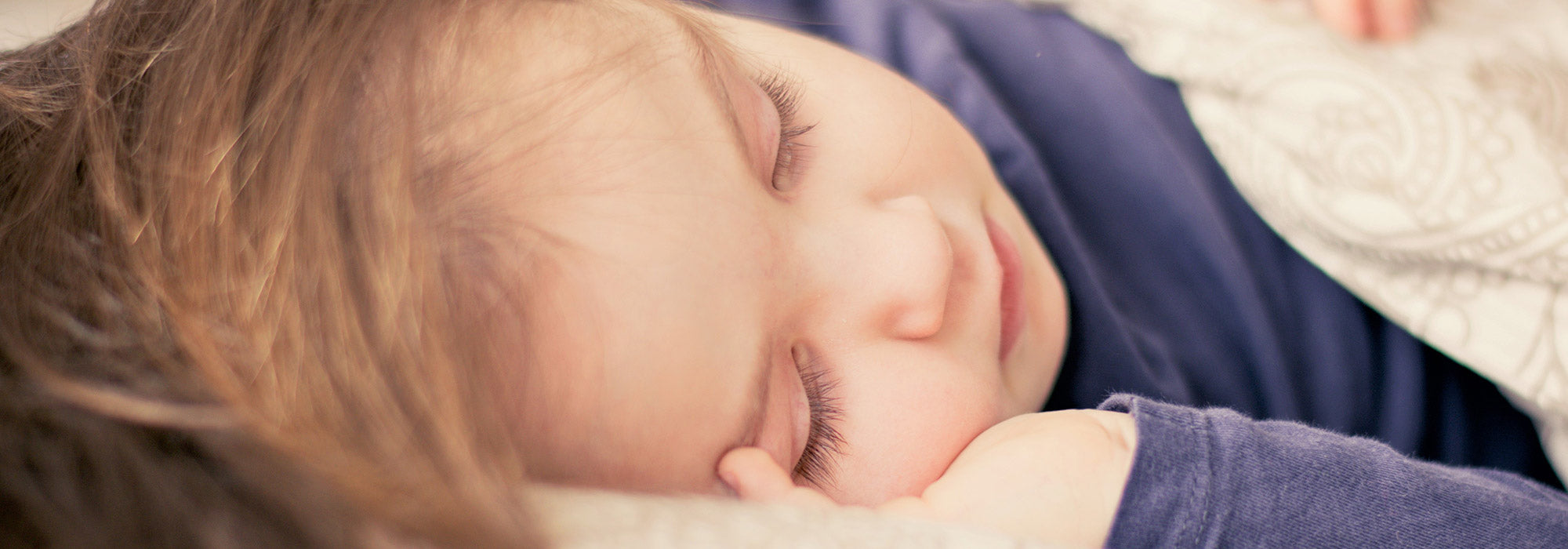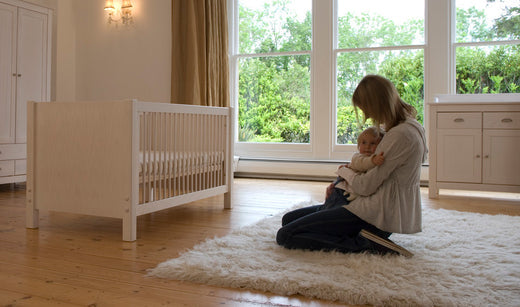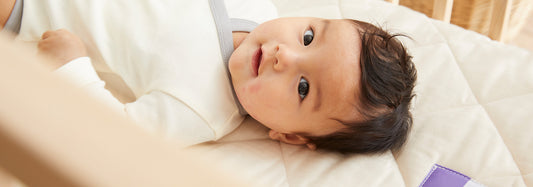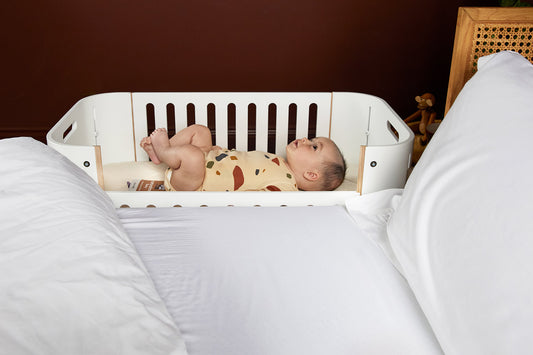As a parent of a newborn baby, sleep is a big topic. Whether it’s thinking about the fact you haven’t had enough sleep or wondering when your little one will sleep through the night.
There’s a lot of advice about things you can do to get your baby to sleep through the night. The problem is some of this advice is misleading as it is based on myths.
Our Sleep Expert Christabel sets to untangle the most common myths from the facts. 
Myth: There is a "best" method to getting a baby to sleep through the night.
CM: Not all babies are the same when it comes to sleep so believing there is a magic method that can be used to get any baby to sleep is an unhelpful belief.
While one baby may appear to respond well to a particular method, unless it is a controlled trial, it is never clear if the baby would have behaved that way with or without the intervention.
The problem is babies are not born with a developed circadian rhythm, one of the systems that control sleep/wake patterns.
This circadian rhythm or body clock, takes time to develop, and every baby is different. If your baby’s circadian rhythm has not developed enough to allow her/him to sleep through the night, you will end up becoming very frustrated by believing there are a specific set of rules that can do this.
There are a few things you can do to help a baby’s circadian rhythm develop such as turning down lights at bedtime, reducing noise and social interaction. This will help the baby to begin to associate night with sleep.
In the past, Naturalmat ran a Baby Sleep Challenge, recruiting a toddler and their parents to test out swapping synthetic foam mattress their baby was sleeping on for our organic natural fibre mattress and organic bedding to see what impact this would have on the sleeping patterns…you can check out the results of that trial here.
The Baby Sleep Challenge was so popular with the parents that Naturalmat are running Baby Sleep challenge again! To stay updated about the Sleep Challenge currently running sign up to receive the newsletter and receive invitations to exclusive events, trials and offers in the future.

Myth: Your baby should be sleeping through the night by a certain age.
CM: First, remove the word “should” as there are no fixed dates, only guidelines and there are huge individual differences.
In the first month after birth, a newborn’s sleeping patterns can be very erratic, with several periods of 1 to 3 hours’ sleep duration over the 24 hour period.
Newborn babies will be waking and feeding according to their own schedule, and as a parent it’s best to initially respond to this, rather than try to control it. This may mean resting when your baby is sleeping. Within the first few months, you start to see a resemblance of a day/ night cycle but this is just a beginning and the circadian rhythm will continue to develop over the first two years.
However, by roughly 3-4 months, many babies go for longer stretches of sleep at night, with 4-6 hour periods. The notion that babies can “sleep through the night” by 3 months is based on this sustained, nocturnal sleep period, not a full 8-10 hours. However, some will not sleep for this long at this age as their circadian rhythm may just be a bit slower to develop.
By 6 months, 50% of babies are sleeping through the night, with 90% reaching this by 12 months.
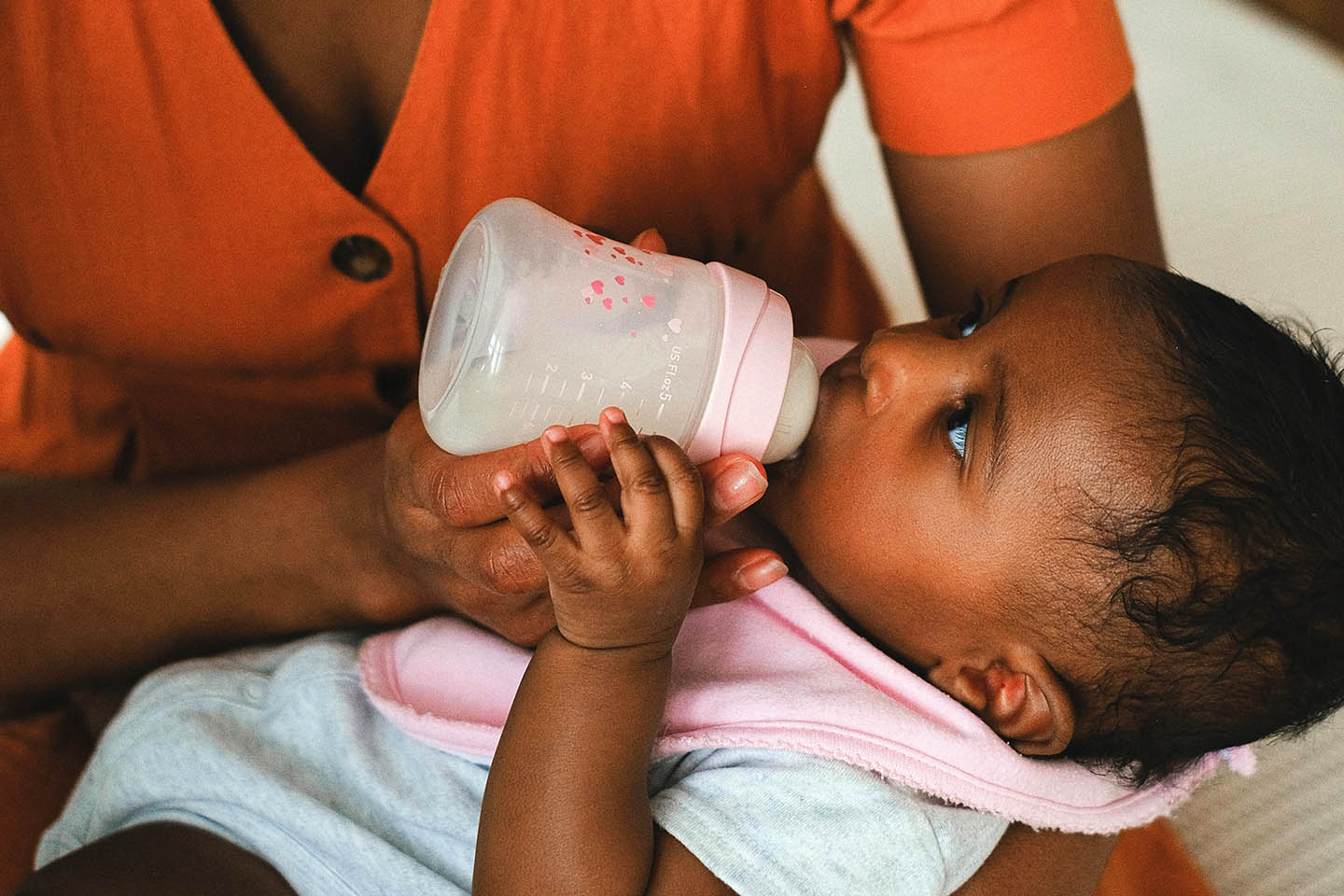
Myth: You can encourage your baby to sleep longer by using formula or adding baby rice to their bottle.
CM: There is absolutely no evidence that adding baby rice to a baby’s bottle will make them sleep longer.
In fact, introducing solid food before a baby is ready can lead to digestive problems or food allergies as their digestive system is not mature enough to take this.
In addition, there is some evidence that feeding babies solid food before the recommended age of 4-6 months can increase the risk of obesity. Research shows that babies fed on formula do not sleep better, although they may sleep longer initially. This is because formula feed takes longer to digest.
However, breast milk contains melatonin, one of the hormones that regulate the circadian rhythm and breast-fed babies don’t take long to catch up with the formula-fed babies.
In addition, there are many additional benefits to breast feeding, including a reduced risk of sudden infant death syndrome (SIDS), infections and cardiovascular disease in later life.

Myth: Sleep training will damage your bond with your baby.
CM: Many parents consider some form of sleep training if their babies are not showing more consolidated sleeping at night by 6 months.
A common concern is this will damage the bond between baby and parent, or lead to emotional or behavioural problems. However, according to a small trial, there is no evidence that this is true.
Babies aged between 6 months and 16 months were included in the study which investigated controlled crying (graduated extinction) and a technique called bedtime fading. There was also a control group with no intervention.
With controlled crying, parents do not respond to their babies’ crying immediately, but allow a set time interval to pass before they comfort them, with these periods becoming longer and longer until the baby drops off to sleep.
Bedtime fading is a gentler approach whereby parents delayed their babies’ bedtime by 15 minutes for a few nights, delaying it a further 15 minutes if the baby is still having trouble sleeping.
After 3 months it was shown that both interventions lead to babies falling asleep faster than before the intervention, compared to the control group which saw little change. There was also less waking in the night in the controlled crying group (an average of one or two times a night compared to three times before the intervention).
There was no evidence that either method was detrimental to the parent-baby bond or that they caused emotional or behavioural problems at 12 months.
However, no measures were taken beyond this point. Stress levels were reduced for mothers in both intervention groups. Since sleep is an integral part of both the baby’s and parents’ physical and mental health, a sleep intervention at an appropriate age may actually aid bonding and emotional wellbeing in the family.
Training your baby to sleep or dealing with your baby not sleeping through the night can be exhausting and for you to feel refreshed after whatever long or short sleep you get yourself, Naturalmat recommends you sleep on their organic and natural mattresses for adults which are designed to help you get the best possible night’s sleep and also care about the environment at the same time, allowing you to be on your best for your baby through the crucial period in their sleep development.
As a parent, it can be difficult to separate the truth from the many baby sleeping myths that circulate around, so we hope this Q&A has been helpful! If you are looking for any more advice on your baby’s sleeping habits, then please take a look at our Baby and Child blog articles.
